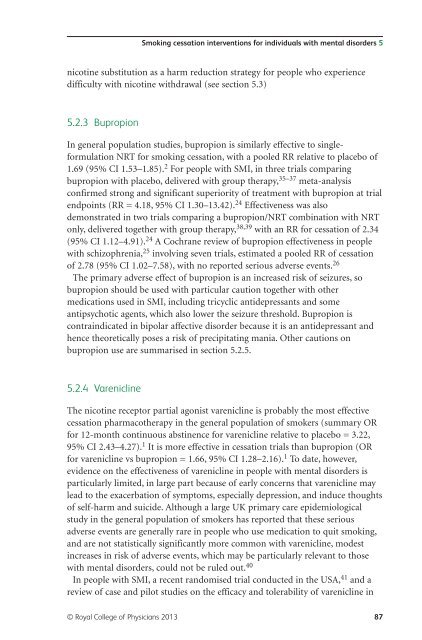Smoking and mental health - NCSCT
Smoking and mental health - NCSCT
Smoking and mental health - NCSCT
Create successful ePaper yourself
Turn your PDF publications into a flip-book with our unique Google optimized e-Paper software.
<strong>Smoking</strong> cessation interventions for individuals with <strong>mental</strong> disorders 5<br />
nicotine substitution as a harm reduction strategy for people who experience<br />
difficulty with nicotine withdrawal (see section 5.3)<br />
5.2.3 Bupropion<br />
In general population studies, bupropion is similarly effective to singleformulation<br />
NRT for smoking cessation, with a pooled RR relative to placebo of<br />
1.69 (95% CI 1.53–1.85). 2 For people with SMI, in three trials comparing<br />
bupropion with placebo, delivered with group therapy, 35–37 meta-analysis<br />
confirmed strong <strong>and</strong> significant superiority of treatment with bupropion at trial<br />
endpoints (RR = 4.18, 95% CI 1.30–13.42). 24 Effectiveness was also<br />
demonstrated in two trials comparing a bupropion/NRT combination with NRT<br />
only, delivered together with group therapy, 38,39 with an RR for cessation of 2.34<br />
(95% CI 1.12–4.91). 24 A Cochrane review of bupropion effectiveness in people<br />
with schizophrenia, 25 involving seven trials, estimated a pooled RR of cessation<br />
of 2.78 (95% CI 1.02–7.58), with no reported serious adverse events. 26<br />
The primary adverse effect of bupropion is an increased risk of seizures, so<br />
bupropion should be used with particular caution together with other<br />
medications used in SMI, including tricyclic antidepressants <strong>and</strong> some<br />
antipsychotic agents, which also lower the seizure threshold. Bupropion is<br />
contraindicated in bipolar affective disorder because it is an antidepressant <strong>and</strong><br />
hence theoretically poses a risk of precipitating mania. Other cautions on<br />
bupropion use are summarised in section 5.2.5.<br />
5.2.4 Varenicline<br />
The nicotine receptor partial agonist varenicline is probably the most effective<br />
cessation pharmacotherapy in the general population of smokers (summary OR<br />
for 12-month continuous abstinence for varenicline relative to placebo = 3.22,<br />
95% CI 2.43–4.27). 1 It is more effective in cessation trials than bupropion (OR<br />
for varenicline vs bupropion = 1.66, 95% CI 1.28–2.16). 1 To date, however,<br />
evidence on the effectiveness of varenicline in people with <strong>mental</strong> disorders is<br />
particularly limited, in large part because of early concerns that varenicline may<br />
lead to the exacerbation of symptoms, especially depression, <strong>and</strong> induce thoughts<br />
of self-harm <strong>and</strong> suicide. Although a large UK primary care epidemiological<br />
study in the general population of smokers has reported that these serious<br />
adverse events are generally rare in people who use medication to quit smoking,<br />
<strong>and</strong> are not statistically significantly more common with varenicline, modest<br />
increases in risk of adverse events, which may be particularly relevant to those<br />
with <strong>mental</strong> disorders, could not be ruled out. 40<br />
In people with SMI, a recent r<strong>and</strong>omised trial conducted in the USA, 41 <strong>and</strong> a<br />
review of case <strong>and</strong> pilot studies on the efficacy <strong>and</strong> tolerability of varenicline in<br />
© Royal College of Physicians 2013 87














